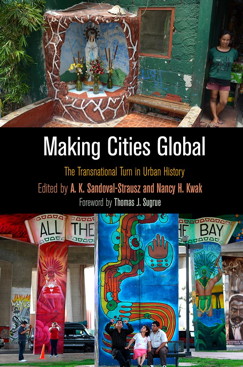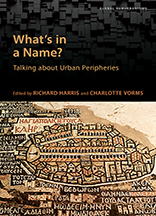This is the second in what will be an ongoing series of profiles of GUHP members' work, highlighting the sheer breadth of scholarship in the field of global urban history.
Please consider ordering these titles for your personal and university libraries.
The series also salutes the work of networks and associations whose missions
overlap that of GUHP in significant ways.
Membership in GUHP is free of charge. To join visit our Homepage
|
|
|
Prize Winner Cities in Motion: Urban Life and Cosmopolitanism in Southeast Asia, 1920–1940
Winner of the 2015–2016 Urban History Association Best Book Award
by Su Lin Lewis (Modern Global History, Bristol)
(Cambridge University Press, 2016)
In the 1920s and 1930s, the port-cities of Southeast Asia were staging grounds for diverse groups of ordinary citizens to experiment with modernity, as a rising Japan and American capitalism challenged the predominance of European empires after the First World War. Both migrants and locals played a pivotal role in shaping civic culture. Moving away from a nationalist reading of the period, Su Lin Lewis explores layers of cross-cultural interaction in various spheres: the urban built environment, civic associations, print media, education, popular culture and the emergence of the modern woman. [more]
GUH blog entry, GUHP profile, Author website
|
| |
|
|
|
 |
|
|
|
|
Brand New Making Cities Global:
The Transnational Turn in Urban History
Edited by Nancy H. Kwak (History, UC San Diego) and A. K. Sandoval-Strausz (History, Penn State, as of 2018)
(University of Pennsylvania Press, 2017)
In recent decades, hundreds of millions of people across the world have moved from rural areas to metropolitan regions, some of them crossing national borders on the way. While urbanization and globalization are proceeding with an intensity that seems unprecedented, these are only the most recent iterations of long-term transformations—cities have for centuries served as vital points of contact between different peoples, economies, and cultures. Making Cities Global explores the intertwined development of urbanization and globalization using a historical approach that demonstrates the many forms transnationalism has taken, each shaped by the circumstances of a particular time and place. [more]
GUH blog, GUHP profile: Kwak, Sandoval-Strausz,
Editor webites: Kwak, Sandoval-Strausz
|
|
|
|
|
 |
|
|
|
|
Brand New What's In A Name:
Talking About Urban Peripheries
Edited by Richard Harris (Geography, McMaster) and Charlotte Vorms (Geopraphy, Paris-Sorbonne)
(University of Toronto Press, 2017)
In What’s in a Name? editors Richard Harris and Charlotte Vorms have gathered together experts from around the world in order to provide a truly global framework for the study of the urban periphery. Rather than view these distinct communities through the lens of the western notion of urban sprawl, the contributors focus on the variety of everyday terms that are used, together with their connotations. This volume explores the local terminology used in cities such as Beijing, Bucharest, Montreal, Mumbai, Rio de Janeiro, Rome, Sofia, as well as more broadly across North America, Australia, Southeast Asia, and elsewhere. What’s in a Name? is the first book in English to pay serious and sustained attention to the naming of the urban periphery worldwide. By exploring the ways in which local individuals speak about the urban periphery Harris and Vorms bridge the assumed divide between the global North and the global South. [more]
GUHP profile: Harris Editor websites: Harris, Vorms
|
|
|
|
| |
|
"Urbanism and Exchange in the North Atlantic/Baltic, 600–1000 CE,"
in T. Hodos (ed.), The Routledge Handbook of Archaeology and Globalization
by Søren M. Sindbæk (Medieval Archaeology, Aarhus)
(Routledge, 2016)
Throughout most of the first millennium AD, societies in Scandinavia and around the Baltic Sea operated beyond the world of walled cities, professional armies, taxes and record-keeping bureaucracies, which had shaped the social order across much of Europe since at least the Roman conquests. Even so, Northern Europe had an outstanding geographical potential: This was a realm of islands and peninsulas bordering several great seas. This study surveys the process of urbanization and network formation which was catalyzed when, in the latter half of the first millennium CE, the technology of sea transport expanded, and connectivity became the basis of a trajectory of cultural change. [more]
GUHP profile, Author webiste
|
|
|
|
|
|
Lagos Studies Association
GUHP salutes the brand-new Lagos Studies Association. We admire your energy and wish you well in your Annual Lagos Conferences and your Global Lagos Symposia.
Established in 2017, the Lagos Studies Association is an international, interdisciplinary organization of academic and non-academic practitioners whose interest focus on Lagos and its peoples. Our members include scholars, students, activists, artists, teachers, donors, policymakers, and development professionals. Through exchanges between academic and non-academic practitioners, we anticipate deepening the rigor of contemporary scholarship as well as encouraging the integration of critical and thought-provoking questions into non-academic projects on Lagos. [more]
|
|
|
|
To read back-issues of “Noteworthy in Global Urban History,” please click here.
|
| |